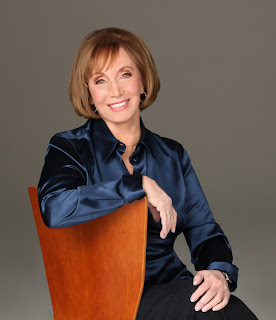Julie Garwood is the author of more than 30 historical and romantic suspense novels, and 36 million copies of her books are in print. Twenty of them have appeared on the New York Times Bestsellers list. She also writes YA novels as Emily Chase.
Julie, tell us about The Ideal Man.
It's a story of a young woman who is facing two threats.The first one has been with her from her childhood, and the second one comes from an incident that she is thrown into by coincidental circumstance.
Despite the fear she's faced since she was young, she's managed to become a dedicated surgeon. She's successful and self assured; yet, there's always that vulnerability inside. She's never really allowed herself to let go . . . until the second threat appears. She accidentally becomes a witness to a crime, and the FBI agent on the case not only helps her resolve her fears but also opens her up to emotions she's never felt before.
How did growing up in a large Irish family lend
itself to storytelling?
The Irish are by nature great storytellers I think. It seems to come with the genes. They bring out all the nuances of a situation, and I loved sitting around the dinner table listening to my family talk. Also, growing up in a family of seven children taught me that self-expression had to be quick and forceful.
Why did you begin writing YA books and historicals?
I had young children when I began, so I was drawn to that genre, but I was also interested in historical novels. I had taken a medieval history class in college that I absolutely loved, so I was following that passion as well. My first book, A Girl Named Summer, was published by Scholastic, and shortly after that, Gentle Warrior was published by Pocket Books. The historical novels found a growing audience, and the publishers asked for more of them, so that's that direction my writing has taken.
While I really enjoy writing the adult books, I'm hoping to find the time to write a few more for young readers someday.
How have your books evolved over the years?
I haven't changed my themes much. I still write about family and loyalty, and I try to insert some humor into my stories. There's always an element of intrigue or suspense and the romance between the hero and heroine is absolutely key. The setting has changed somewhat. I started with historical novels and I've moved into contemporary settings in the last few years. I enjoy each of them, so my goal is to find the time to write both.
What's your writing schedule like?
I like to begin writing early in the morning. It's a routine I started when my children were young. I'd get up early and work on my book before they were awake. I usually have the TV on, though I'm not watching it. It's just background noise. This is a habit that developed when I was a child doing my homework around a table with my siblings. In order to concentrate, I learned to block out the distractions.
Do you outline your novels and do you aim for a certain amount of words each day?
I know where the story is headed, but I don't follow a rigid outline. I find that if I let the story evolve, there will always be some surprises along the way that make it more fun. I can't predict how much I'll produce. There are times when the words just flow and I'll write one or two chapters in a day. Then there are times when I can't seem to get a scene right and I may spend two or three days on one page.
Why do some books make the bestseller lists while other equally well-written books fail?
That's a million dollar question. If I had the answer to that, I'd be a genius. I do believe, though, that there are a great many elements involved. They include some marketing, some talent, and a great deal of luck.
Advice to fledgling novelists?
First, stay focused and set aside some time each and every day to work on your writing. It's important that you get into a rhythm and have the discipline to finish your manuscript.
Second, let your voice be heard in your writing. If your reader can hear you talking to them in your words, they're more likely to listen to what you have to say.
Third, develop a network. Writers' organizations and conferences and conferences give you opportunities to meet agents and editor, and that will help you learn more about the publishing business and perhaps give you a leg up in getting published.
How would you occupy your time if you weren't writing?
Family would probably take up most of my time. I have a large extended family, so there's always something going on.

Thank you for an enjoyable visit.
You can visit Julie Garwood's website at: http://www.juliegarwood.com/
At Facebook: www.Facebook.com/juliegarwood
and at Twitter: @JulieGarwood
Julie Garwood's interview will be among those featured in my forthcoming book, The Mystery Writers, including Sue Grafton, Lawrence Block, J.A. Jance and many others.

Great interview, Jean. Thanks very much for letting us take a peak inside your writing life, Ms. Garwood.
ReplyDeleteThanks, girlparker. I love interviewing successful writers, especially someone as nice as Julie Garwood.
ReplyDeleteLove the comment about self-expression being quick and forceful. Thanks Julie and Jean!
ReplyDeleteLovely interview, and it's refreshing to learn a bit about Julie. Thank you for sharing. I come from a family of storytellers, too. Great memories.
ReplyDeleteThank you, Anne and Marja, for the kind words and for stopping by.
ReplyDelete